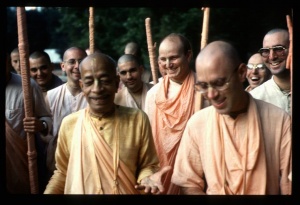SB 10.13.37: Difference between revisions
m (1 revision(s)) |
No edit summary |
||
| Line 1: | Line 1: | ||
{{info | {{info | ||
|speaker=Lord | |speaker=Lord Balarāma the Supreme Personality of Godhead | ||
|listener=Lord | |listener=Lord Balarāma the Supreme Personality of Godhead considering to Himself | ||
}} | }} | ||
[[Category:Srimad-Bhagavatam - Canto 10 Chapter 13]] | |||
[[Category:Bhagavatam Verses Spoken by Lord Balarama - Vanisource|101337]] | |||
<div style="float:left">'''[[Srimad-Bhagavatam]] - [[SB 10|Tenth Canto]] - [[SB 10.13: The Stealing of the Boys and Calves by Brahma|Chapter 13: The Stealing of the Boys and Calves by Brahmā]]'''</div> | |||
<div style="float:right">[[File:Go-previous.png|link=SB 10.13.36]] '''[[SB 10.13.36]] - [[SB 10.13.38]]''' [[File:Go-next.png|link=SB 10.13.38]]</div> | |||
{{RandomImage}} | |||
==== TEXT 37 ==== | ==== TEXT 37 ==== | ||
<div | <div class="verse"> | ||
keyaṁ vā kuta āyātā | :keyaṁ vā kuta āyātā | ||
daivī vā nāry utāsurī | :daivī vā nāry utāsurī | ||
prāyo māyāstu me bhartur | :prāyo māyāstu me bhartur | ||
nānyā me 'pi vimohinī | :nānyā me 'pi vimohinī | ||
</div> | </div> | ||
| Line 17: | Line 22: | ||
==== SYNONYMS ==== | ==== SYNONYMS ==== | ||
<div | <div class="synonyms"> | ||
''kā''—who; ''iyam''—this; ''vā''—or; ''kutaḥ''—from where; ''āyātā''—has come; ''daivī''—whether demigod; ''vā''—or; ''nārī''—woman; ''uta''—or; ''āsurī''—demoness; ''prāyaḥ''—in most cases; ''māyā''—illusory energy; ''astu''—she must be; ''me''—My; ''bhartuḥ''—of the master, Lord Kṛṣṇa; ''na''—not; ''anyā''—any other; ''me''—My; ''api''—certainly; ''vimohinī''—bewilderer. | |||
</div> | </div> | ||
| Line 24: | Line 29: | ||
==== TRANSLATION ==== | ==== TRANSLATION ==== | ||
<div | <div class="translation"> | ||
Who is this mystic power, and where has she come from? Is she a demigod or a demoness? She must be the illusory energy of My master, Lord Kṛṣṇa, for who else can bewilder Me? | Who is this mystic power, and where has she come from? Is she a demigod or a demoness? She must be the illusory energy of My master, Lord Kṛṣṇa, for who else can bewilder Me? | ||
</div> | </div> | ||
| Line 31: | Line 36: | ||
==== PURPORT ==== | ==== PURPORT ==== | ||
<div | <div class="purport"> | ||
Balarāma was surprised. This extraordinary show of affection, He thought, was something mystical, performed either by the demigods or some wonderful man. Otherwise, how could this wonderful change take place? "This māyā might be some rākṣasī-māyā," He thought, "but how can rākṣasī-māyā have any influence upon Me? This is not possible. Therefore it must be the māyā of Kṛṣṇa." He thus concluded that the mystical change must have been caused by Kṛṣṇa, whom Balarāma considered His worshipable Personality of Godhead. He thought, "It was arranged by Kṛṣṇa, and even I could not check its mystic power." Thus Balarāma understood that all these boys and calves were only expansions of Kṛṣṇa. | Balarāma was surprised. This extraordinary show of affection, He thought, was something mystical, performed either by the demigods or some wonderful man. Otherwise, how could this wonderful change take place? "This ''māyā'' might be some ''rākṣasī-māyā''," He thought, "but how can ''rākṣasī-māyā'' have any influence upon Me? This is not possible. Therefore it must be the ''māyā'' of Kṛṣṇa." He thus concluded that the mystical change must have been caused by Kṛṣṇa, whom Balarāma considered His worshipable Personality of Godhead. He thought, "It was arranged by Kṛṣṇa, and even I could not check its mystic power." Thus Balarāma understood that all these boys and calves were only expansions of Kṛṣṇa. | ||
</div> | </div> | ||
__NOTOC__ | |||
<div style="float:right; clear:both;">[[File:Go-previous.png|link=SB 10.13.36]] '''[[SB 10.13.36]] - [[SB 10.13.38]]''' [[File:Go-next.png|link=SB 10.13.38]]</div> | |||
__NOTOC__ | |||
__NOEDITSECTION__ | |||
Revision as of 11:12, 20 May 2021

A.C. Bhaktivedanta Swami Prabhupada
TEXT 37
- keyaṁ vā kuta āyātā
- daivī vā nāry utāsurī
- prāyo māyāstu me bhartur
- nānyā me 'pi vimohinī
SYNONYMS
kā—who; iyam—this; vā—or; kutaḥ—from where; āyātā—has come; daivī—whether demigod; vā—or; nārī—woman; uta—or; āsurī—demoness; prāyaḥ—in most cases; māyā—illusory energy; astu—she must be; me—My; bhartuḥ—of the master, Lord Kṛṣṇa; na—not; anyā—any other; me—My; api—certainly; vimohinī—bewilderer.
TRANSLATION
Who is this mystic power, and where has she come from? Is she a demigod or a demoness? She must be the illusory energy of My master, Lord Kṛṣṇa, for who else can bewilder Me?
PURPORT
Balarāma was surprised. This extraordinary show of affection, He thought, was something mystical, performed either by the demigods or some wonderful man. Otherwise, how could this wonderful change take place? "This māyā might be some rākṣasī-māyā," He thought, "but how can rākṣasī-māyā have any influence upon Me? This is not possible. Therefore it must be the māyā of Kṛṣṇa." He thus concluded that the mystical change must have been caused by Kṛṣṇa, whom Balarāma considered His worshipable Personality of Godhead. He thought, "It was arranged by Kṛṣṇa, and even I could not check its mystic power." Thus Balarāma understood that all these boys and calves were only expansions of Kṛṣṇa.